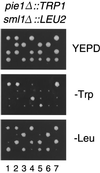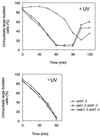Pie1, a protein interacting with Mec1, controls cell growth and checkpoint responses in Saccharomyces cerevisiae
- PMID: 11154263
- PMCID: PMC86667
- DOI: 10.1128/MCB.21.3.755-764.2001
Pie1, a protein interacting with Mec1, controls cell growth and checkpoint responses in Saccharomyces cerevisiae
Abstract
In eukaryotes, the ATM and ATR family proteins play a critical role in the DNA damage and replication checkpoint controls. These proteins are characterized by a kinase domain related to the phosphatidylinositol 3-kinase, but they have the ability to phosphorylate proteins. In budding yeast, the ATR family protein Mec1/Esr1 is essential for checkpoint responses and cell growth. We have isolated the PIE1 gene in a two-hybrid screen for proteins that interact with Mec1, and we show that Pie1 interacts physically with Mec1 in vivo. Like MEC1, PIE1 is essential for cell growth, and deletion of the PIE1 gene causes defects in the DNA damage and replication block checkpoints similar to those observed in mec1Delta mutants. Rad53 hyperphosphorylation following DNA damage and replication block is also decreased in pie1Delta cells, as in mec1Delta cells. Pie1 has a limited homology to fission yeast Rad26, which forms a complex with the ATR family protein Rad3. Mutation of the region in Pie1 homologous to Rad26 results in a phenotype similar to that of the pie1Delta mutation. Mec1 protein kinase activity appears to be essential for checkpoint responses and cell growth. However, Mec1 kinase activity is unaffected by the pie1Delta mutation, suggesting that Pie1 regulates some essential function other than Mec1 kinase activity. Thus, Pie1 is structurally and functionally related to Rad26 and interacts with Mec1 to control checkpoints and cell proliferation.
Figures










References
-
- Allen J B, Zhou Z, Siede W, Friedberg E C, Elledge S J. The SAD1/RAD53 protein kinase controls multiple checkpoints and DNA damage-induced transcription in yeast. Genes Dev. 1994;8:2416–2428. - PubMed
-
- Aris J P, Blobel G. Isolation of yeast nuclei. Methods Enzymol. 1991;194:735–749. - PubMed
-
- Banin S, Moyal L, Shieh S, Taya Y, Anderson C W, Chessa L, Smorodinsky N I, Prives C, Reiss Y, Shiloh Y, Ziv Y. Enhanced phosphorylation of p53 by ATM in response to DNA damage. Science. 1998;281:1674–1677. - PubMed
Publication types
MeSH terms
Substances
LinkOut - more resources
Full Text Sources
Other Literature Sources
Molecular Biology Databases
Research Materials
Miscellaneous
